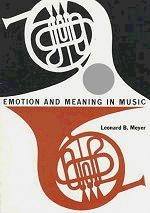
Emotion and Meaning in Music by Leonard B. Meyer. (c) 1956 University of Chicago Press, Chicago

Last night I finished reading Emotion and Meaning in Music by Leonard B. Meyer. It was something I picked up many years ago for a Music Cognition course. It's a compelling topic but one that I find notoriously difficult to actually write about or discuss (or read about for that matter).
I'll admit to having my own perspective/agenda as a composer and deeply opinionated listener. I've long regarded emotion and meaning triggered by audio stimulus as psychological equivalents to the optical illusion of rainbows. They only appear tangible. Writing something substantive about emotion and meaning in music is a bit like pursuing the proverbial pot of gold located at the foot of something that only appears to exist.
Leonard B. Meyer deserves enormous respect for his academic rigor at tackling this subject. His arguments never dissolve into an ephemeral haze of favoring a personal interpretation of "emotion" over another. He also effectively anticipates many of my own arguments and aesthetic disposition with thoughtful counter-arguments or by not overstepping the limits of his own theory.
Much of my difficulty with this book, and this subject in general, are related to my discomfort with the field of music cognition itself. It's hard to shed my composer's perspective and see things from the psychologist’s point of view. It's hard not to feel like there's an enormously limiting set of assumptions at work when discourse is limited to tonal syntax or when discussion of “non-western” tradition is painfully less detailed. His stated aversion to "numerical mysticism" hinders a deeper understanding of the physical properties of sound itself in favor of uneven conclusions about observed preferences. While there is much to admire about the work being done to understand human perception and the ongoing peer-review process required to build a substantial field I continue to have a nagging feeling that “progress” is lagging well behind contemporary reality as cognitionists continue to wage aesthetic battles that are irrelevant to how the contemporary mind perceives music in a “post-Napster” world.
Where Meyer seems to "get it right" is when he describes the broad strokes of stylistic expectation and begins to apply temporal gestalt theory to sonic perception. He hits upon principles that transcend narrow stylistic and language constraints and begins to move toward territory so brilliantly explored in James Tenney’s Meta Hodos and Meta Meta Hodos. Meyer leaves me hungry for examples and supporting arguments from a more pluralistic set of musical examples.
It’s hard to escape the sense that this is a voice speaking from across nearly half a century. As insightful and disciplined as that voice is there are several revolutions have run their course since then that really changed music perception for many people. The serialist movement was approaching its peak of influence. Ornette Coleman, John Coltrane and Albert Ayler were about to transform the possibilities of jazz music in ways that render Meyer's words about jazz hollow. Elvis Presley and rock and roll were about to completely transform the social reality of music and create the phenomenon of mass audience. Broadcasting and recording arts helped to usher in an era of art-less music that serves more as a vehicle for meme than individual expression. Limiting discussion and examples to orchestral and chamber works feels especially narrow on the other side of the rock and roll revolution.
The revolution between 1956 and today that most effectively filters my reading of this book is the John Cage revolution. This is where my perspective as a composer feels at odds with the psychologist/cognition perspective. Two pages away from the end of the book Meyer hints at where the cracks form: "The attack upon such referential musical experience has focused (1) upon the causal connection between the musical stimulus and the referential response, (2) upon the apparent disparity between the responses of different listeners, and (3) upon the lack of specificity in the responses made." At which point I decide that there’s a much simpler explanation: emotion resides in the individual. Emotional response is strongly associated with music, but isn’t physically there any more than the rainbow is physically in the air. It is possible for the composer to calculate the intended "emotional response" and "perceived meaning" that he/she wishes to trigger in the listener so long as all parties involved are fluent with the stylistic peculiarities and history of the genre at hand. It’s a bit like standing at the right angle for the eye to perceive colorful bands. The Cage revolution points to a decidedly different approach to music perception. One that places much less value on such calculated emotional evocation. By composing a body of music free from such calculated emotion/meaning intent Cage opened the ears of subsequent generations to the exquisite range of sonic experience available to anyone willing to perceive it. After Cage there is a sense that art music can transcend mere emotion and meaning. And I’d go even a step further and state that music that self-consciously attempts to shape listener emotions and apply concrete meanings to abstract sound runs the risk of pettiness. My post-Cage sensibility rebels at the shackling of sonic substance for decidedly non-transcendent intent.
Emotion and meaning in music is an excruciatingly difficult subject and Meyer really does do an admirable job at tackling it. His is a line of thought that needs to be revisited, updated and built upon.


No comments:
Post a Comment